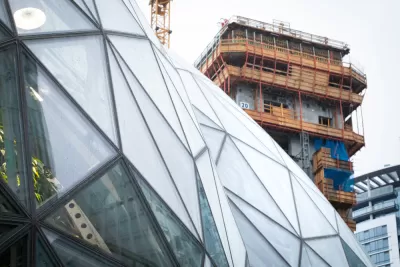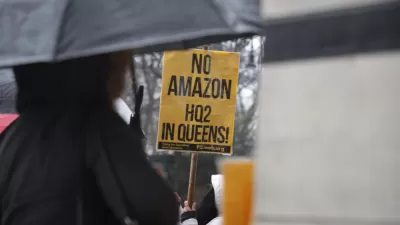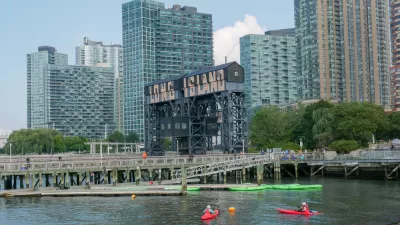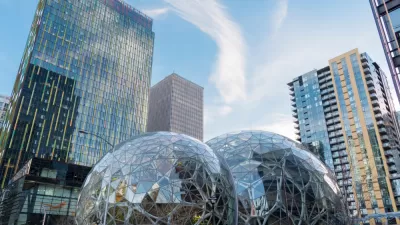After the news broke that Amazon was reportedly going to split its HQ2 plans between New York City and Washington, D.C., some cities are left console themselves. A Planetizen opinion piece picks up the pieces.

On Monday morning, reports from inside the Amazon second headquarters (HQ2) selection process were that Dallas was one of three finalist cities still in the hunt to land the economic development prize of the year, maybe the last two years, or even longer: 50,000 highly-skilled employees at one of the largest companies in the country. By the end of the day, however, more reported indicated that Dallas was the last runner up—as HQ2 would actually be split between the other two finalist cities: New York and D.C.
So the Dallas Morning News editorial board began looking for lessons. That lesson comes, as it turns out, in the form of a pretty good burn:
First, we will point out that if Amazon does indeed create two new equal second headquarters in New York and the Virginia suburbs of Washington, D.C., it will have done so after winning concessions that essentially make the regulatory and tax landscape of those locales look more like that of Texas. The fact that Dallas was in the hunt so late into the process indicates to us that at some level Texas was setting a bar for those East Coasters to beat. So we are sincere in saying, celebrate the cold comfort of that Dallas.
Touché, Texas. Touché.
The editorial includes a few more lessons, including one about the key to economic development success not coming from massive tax incentives, but in removing barriers to growth (a key which Dallas has figured out, according to the Dallas Morning News).
But what if you don't have Texas-sized confidence to console the collective grief of the city? What if you only have the 2018 World Series trophy, and a host of recent major sports championships, to keep the city warm through the winter? In Boston, Scott Kirsner writes well over a year after calling the win for Boston (wrong sport, Kirsner), looking for lessons (or equivocations) after getting the call so wrong. Here's why "being stiffed" by Amazon is good for Boston, according to Kirsner's contacts in the city's business community.
- "'I was afraid if we landed Amazon, they’d take all the oxygen out of the room,' said David Townsend of real estate firm Newmark Knight Frank."
- "Tim Rowe, the founder and CEO of the Cambridge Innovation Center, said his impulse is to congratulate the winning city, and then 'say that half of me is very pleased that we remain a region of the country that is primarily owned by the little startup guy and idealism.'"
- According to Venture capitalist Russ Wilcox, Boston is still picking up a big slice of Amazon investment, and in losing HQ2, "we do not have to absorb the thousands of lower-paying administrative jobs that would have clogged up our infrastructure and housing."
That sounds like Boston talking about Aaron Boone in 2003 to me.
Thinking on a more national scale, for all of the other cities that didn't win the Amazon Series of Champions this year, Emily Badger delivers some bad news in the pages of the New York Times. When it comes to superstar cities, and the ability attract superstar companies, the rich get richer.
In the end, even Amazon has behaved according to this rule: In the modern tech economy, cities that already have wealth, opportunity, highly educated workers and high salaries will just keep attracting more of them.
That's bad news for all the also-rans:
A small number of rich and internationally connected cities keep increasing their economic advantages — and as a result, the inequality widens between them and everywhere else.
The Internet this week also reveled one final twist in the Amazon HQ2 saga: one of the winners looking for lessons as well. Lessons they'll have to learn quickly because no one is even sure if they can handle Amazon's arrival. Writing for Curbed New York, Amy Plitt assesses the readiness of Long Island City after the announcement that it would be getting half of the HQ2x2 equation.
LIC was one of four New York City neighborhoods pitched by city and state officials as a possible HQ2 location, and according to the Times, “the state had offered potentially hundreds of millions of dollars in subsidies” in order to get Amazon to the city. (Let us not forget Gov. Andrew Cuomo’s offers to rename both the Newtown Creek and himself for the company.)
The obvious questions raised by this windfall, according to Plitt: "Where will 25,000 Amazon employees live? Where would Amazon build a 500,000-square-foot headquarters? And does this mean the BQX will become a reality?"
The answers to these questions vary in complexity. There re a lot of available rentals and condos in Long Island City, according to Plitt. There are also a lot of new residential projects coming online in the Brooklyn waterfront, nearby. The cost of housing is almost certain to go up, according to Plitt, who heeds the warnings of The Seattle Times when #AmazonHQ2 mania was first sweeping the nation.
Transit gets more complicated, as Long Island City is served by the already packed 7 train. "[As] TransitCenter’s Hayley Richardson put it to Curbed recently, the line is 'hardly equipped to handle its current ridership load.' Add to that 25,000 new workers—along with thousands of riders at its western terminus at Hudson Yards—and you could have one hell of a transit nightmare." Amazon could help expedite the signals that are needed to speed up the 7 train, and could also raise the Brooklyn-Queens Connector (BQX) connector. For those doing the algebra at home: half an HQ2 plus a BQX equals a lot more TNC rides. Solve for congestion.
As a final note, there has to be a post-mortem for the cottage industry of prognosticators and self-style clairvoyants who called on their vast wealth of urban knowledge at every public relations tremor from Amazon to assure their audience that they knew where Amazon's HQ2 would end up. Was that fun for you guys?
In the end, even the people who were right about D.C. or New York got lucky. And they were only half right There was one urbanist, however, more clairvoyant than the rest. Here is Joe Cortright at City Observatory writing in January 2018, almost a year ago: "Amazon is very likely to chose multiple locations (HQ2, HQ3, HQ4) to tap different city specializations, to minimize its negative effect on housing markets, and to continue to its negotiating leverage over 'winners.'"
Planetizen's lesson from the HQ2 saga is this: cheerleading for your city isn't always the best way to help your city. Urbanists must rigorously maintain sobriety when assessing their city's role in the world. Some people are out to capitalize on your love for your city, but there are also many hoping to rise above the fray and achieve prosperity for all. Hopefully Dallas, Boston, Long Island City, D.C., and every other city that flirted with Amazon to try to land HQ2 figure these distinctions out, sooner rather than later.

Trump Administration Could Effectively End Housing Voucher Program
Federal officials are eyeing major cuts to the Section 8 program that helps millions of low-income households pay rent.

Planetizen Federal Action Tracker
A weekly monitor of how Trump’s orders and actions are impacting planners and planning in America.

Ken Jennings Launches Transit Web Series
The Jeopardy champ wants you to ride public transit.

Washington Legislature Passes Rent Increase Cap
A bill that caps rent increases at 7 percent plus inflation is headed to the governor’s desk.

From Planning to Action: How LA County Is Rethinking Climate Resilience
Chief Sustainability Officer Rita Kampalath outlines the County’s shift from planning to implementation in its climate resilience efforts, emphasizing cross-departmental coordination, updated recovery strategies, and the need for flexible funding.

New Mexico Aging Department Commits to Helping Seniors Age ‘In Place’ and ‘Autonomously’ in New Draft Plan
As New Mexico’s population of seniors continues to grow, the state’s aging department is proposing expanded initiatives to help seniors maintain their autonomy while also supporting family caregivers.
Urban Design for Planners 1: Software Tools
This six-course series explores essential urban design concepts using open source software and equips planners with the tools they need to participate fully in the urban design process.
Planning for Universal Design
Learn the tools for implementing Universal Design in planning regulations.
Heyer Gruel & Associates PA
Ada County Highway District
Institute for Housing and Urban Development Studies (IHS)
City of Grandview
Harvard GSD Executive Education
Toledo-Lucas County Plan Commissions
Salt Lake City
NYU Wagner Graduate School of Public Service






























